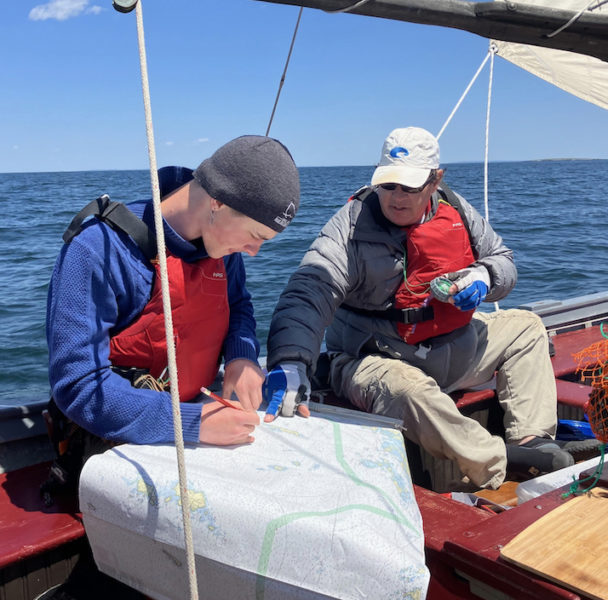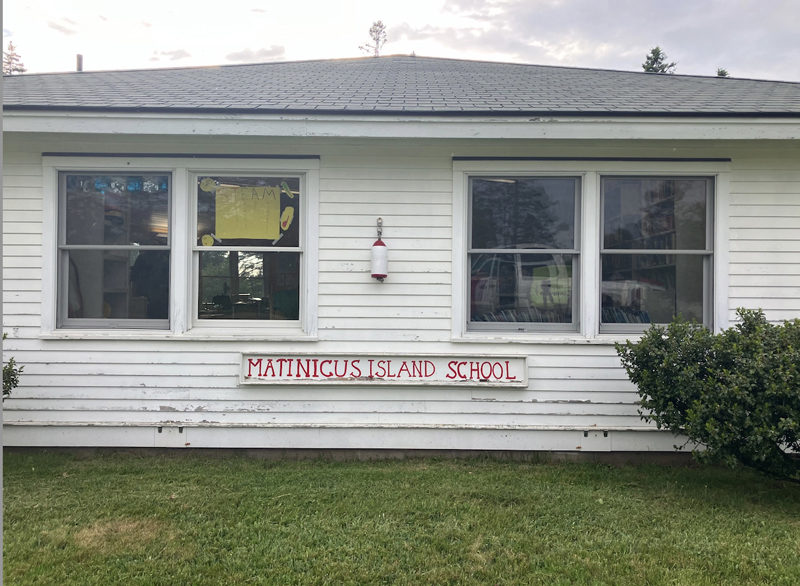
Carpenter’s Boat Shop apprentices chart their 22-mile expedition to Matinicus Island. Expedition sailing is a new addition to the organizations nine-month apprenticeship program. (Photo courtesy Carpenter’s Boat Shop)
For 45 years, the Carpenter’s Boat Shop has welcomed teams of apprentices with programs that begin with basic woodworking skills and extend into community-service programs that support the Pemaquid peninsula.
This week the Boat Shop transported that mix of good work and goodwill 22 miles offshore with a sailing expedition to Matinicus Island. Taking on massive swells and navigating a narrow harbor were just the starting points of the adventure.
Learning the skills of getting to the island and returning to Round Pond are new challenges for Boat Shop apprentices. Repairing the island’s one-room schoolhouse for the welfare of the island community, however, is just the kind of good-neighbor work that has been the Boat Shop’s legacy for the last four-and-a-half decades.
According to Carpenter’s Boat Shop Executive Director Alicia Witham, the Boat Shop planned 15 days for the expedition. Witham, who introduced expedition sailing to the organization’s nine-month apprenticeship program, said the sail between Round Pond and Matinicus could take two to four days to complete.
Once on the island, a year of planning will lead to five or six days of work on a community-service program. “They’re leaving their home on the Carpenter’s Boat Shop campus behind,” Whitman said. “They’ll start quietly with a meet-and-greet with the Matinicus people. They’ll then set to work scraping and painting the one-room schoolhouse while apprentices live and cook inside of it.”
“Depending on the weather, the apprentices likely will spend mornings hiking and getting to know the island. In the afternoon, once the fog clears and the dew disappears, they’ll be either scraping or painting.”
While on the island, the apprentices will follow the Boat Shop tradition of collectively cooking and eating together. Between the sawdust and the paint, the people of Matinicus and the CBS team will have some down time. Plans include a lobster bake, a bonfire with some music, and plenty of time to socialize.
“The way that Matinicus community works is that everybody is involved with a lot of things,” Witham said. “You might be an electrician, but you’re also the schoolteacher, and you’re a builder, but you also fish. People might wear 20 different hats for 20 different jobs just to keep the community rolling.”
Carpenter’s Boat Shop apprentices join a long historical roster of off-islanders who have come to explore Matinicus. Europeans started visiting the island in the 16th century when they discovered the indigenous people had long used the land as a place for hunting and fishing.

The one room schoolhouse on Matinicus Island will get a crisp new look thanks to a team of apprentices from the Carpenters Boat Shop. (Photo courtesy Carpenter’s Boat Shop)
According to Charles A.E. Long’s 1926 history “Matinicus Island, Its Story, and It’s People,” those encounters could be bumpy, citing a 1726 letter from the lieutenant governor of the Massachusetts Bay Colony (Maine remained a part of Massachusetts until 1820), “I very much resent this liberty [the Native Americans at Matinicus] have taken in killing the [livestock] which belong to the English, which is contrary to the Articles of Peace and that common justice which the English and Indians owe to one another.”
Today, a different kind of cultural tension can be disruptive to life on the land the Abenakis called “the far-out island.” One 2022 report identified 95 year-round residents—families that largely make their living from the sea. In high summer season, the island population can increase four-fold, with people who largely come to enjoy the land, not necessarily work it.
Matinicus has a land area of just 2.3 square miles, so the fishing and seasonal communities are in regular contact. As more fair-weather people buy more and more pieces of desirable land, the full time residents are further squeezed.
For families who don’t disappear with warm weather, education is a priority. To serve the existing island families and to attract like-minded people with children, maintaining the one-room island schoolhouse is a critical need.
It’s just that upkeep that brought Carpenter’s Boat Shop to Matinicus. “We are approaching this trip as a one-time community engagement on the island,” Witham said. “That doesn’t mean that we won’t be sailing back there in 2025 for something similar.”
Looking ahead, Witham said she hopes to identify other offshore destination- and service-based initiatives the new expedition-sailing resource can reach. Those initiatives were facilitated two years ago when the Hurricane Island Outward Bound program donated one of its sturdy 50-year-old pulling boats to Carpenter’s Boat Shop which, in turn, repaired and refitted the craft, relaunching it as S/V Harry Precourt and adding a new dimension to the apprenticeship regimen.
Last year, two voyages proved the viability of the sailing expeditions. The Matinicus trek this summer offers proof the organization can serve new communities with new programs that march to the Boat Shop’s on-going drumbeat of community service.
“This is really unique because of the way that we’re getting there,” Witham said. “It’s unique because of the island is 22 miles out to sea, and it’s especially unique because this island and its people are very independent. We’re fortunate to find ways to collaborate with them …They’re committed to that lifestyle, and I think there’s real beauty in sharing the way that we all choose to live and sharing those experiences with each other.”



